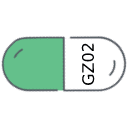Uses
Eliglustat is used to treat Gaucher disease type 1 (a condition in which a certain fatty substance is not broken down normally in the body and builds up in some organs and causes liver, spleen, bone, and blood problems) in certain people. Eliglustat is in a class of medications called enzyme inhibitors. It works by preventing the body from producing the fatty substance so that less of it will build up in the body and cause symptoms.
Side Effects Of Eliglustat
Eliglustat may cause side effects. Tell your doctor if any of these symptoms are severe or do not go away:
- fatigue
- weakness
- joint pain
- headache
- migraine
- nausea
- heartburn
- gas
- mouth and throat pain
- diarrhea
- back pain
- pain in legs or arms
- stomach pain
- cough
- rash
Some side effects can be serious. If you experience any of these symptoms, call your doctor immediately:
- heart palpitations, dizziness, or fainting
- Eliglustat may cause other side effects. Call your doctor if you have any unusual problems while taking this medication.
Warnings & Precautions
Before taking eliglustat:
- tell your doctor and pharmacist if you are allergic to eliglustat, any other medications, or any of the ingredients in eliglustat capsules. Ask your pharmacist or check the Medication Guide for a list of the ingredients.
- tell your doctor and pharmacist what other prescription and nonprescription medications, vitamins, nutritional supplements, and herbal products you are taking or plan to take. Be sure to mention any of the following: amitriptyline; certain medications for abnormal heartbeat such as amiodarone (Nexterone, Pacerone), digoxin (Lanoxin), quinidine (in Nuedexta), procainamide, and sotalol (Betapace, Sorine, Sotylize); bupropion (Aplenzin, Zyban, in Contrave); cimetidine (Tagamet); clarithromycin (Biaxin, in Prevpac), digoxin; diltiazem (Cardizem, Tiazac, others); duloxetine (Cymbalta); erythromycin; fluconazole (Diflucan); fluoxetine (Prozac, Sarafem); indinavir (Crixivan), itraconazole (Onmel, Sporanox), ketoconazole (Nizoral), metoprolol (Toprol); nefazodone, nelfinavir (Viracept), paroxetine (Paxil); rifampin (Rifadin, Rimactane); ritonavir (Norvir, in Kaletra, in Viekira Pak), medications for seizures such as carbamazepine (Carbatrol, Equetro, Tegretol, others), phenobarbital, and phenytoin (Dilantin, Phenytek); sertraline (Zoloft); terbinafine (Lamisil); and verapamil (Calan, Verelan, others); Your doctor may need to change the doses of your medications or monitor you carefully for side effects. Many other medications may also interact with eliglustat, so be sure to tell your doctor about all the medications you are taking, even those that do not appear on this list. Also, tell your doctor or pharmacist if you are taking the following medications: an enzyme replacement therapy such as imiglucerase (Cerezyme), taliglucerase alfa (Elelyso), or velaglucerase alfa (Vpriv). You will need to wait 24 hours after the last dose of these enzyme replacement medications before you begin to take eliglustat.
- tell your doctor what herbal products you are taking, especially St. John’s wort.
- tell your doctor if you have liver disease. Based on the results of your blood test to determine your genetic make-up, your doctor may tell you not to take eliglustat as certain people should not take the medication alone or in combination with other medications, if they have liver disease, or if they have a combination of certain medical conditions and medications.
- tell your doctor if you have or have ever had long QT syndrome (a condition that increases the risk of developing an irregular heartbeat that may cause fainting or sudden death), or another type of irregular heartbeat or heart rhythm problem, or if you have or have ever had a heart attack, heart failure, or heart, or kidney disease.
- tell your doctor if you are pregnant, plan to become pregnant, or are breastfeeding. If you become pregnant while taking eliglustat, call your doctor.
Eliglustat Dosage
Eliglustat comes as a capsule to take by mouth. It is usually taken once or twice daily with or without food. Take eliglustat at around the same time(s) every day. Follow the directions on your prescription label carefully, and ask your doctor or pharmacist to explain any part you do not understand. Take eliglustat exactly as directed. Do not take more or less of it or take it more often than prescribed by your doctor.
Some people may respond differently to eliglustat based on their heredity or genetic make-up. Your doctor will order a blood test to help find the dose of eliglustat that is best for you.
Swallow the capsules whole with water; do not split, open, dissolve, or crush them.
Eliglustat controls Gaucher disease but does not cure it. Continue to take eliglustat even if you feel well. Do not stop taking eliglustat without talking to your doctor.
Other
Keep all appointments with your doctor and the laboratory. Your doctor may order certain lab tests to check your body’s response to eliglustat.
Do not let anyone else take your medication. Ask your pharmacist any questions you have about refilling your prescription.
It is important for you to keep a written list of all of the prescription and nonprescription (over-the-counter) medicines you are taking, as well as any products such as vitamins, minerals, or other dietary supplements. You should bring this list with you each time you visit a doctor or if you are admitted to a hospital. It is also important information to carry with you in case of emergencies.
Source
All information has been provided courtesy of MedLinePlus from the National Library of Medicine and from the FDA.



